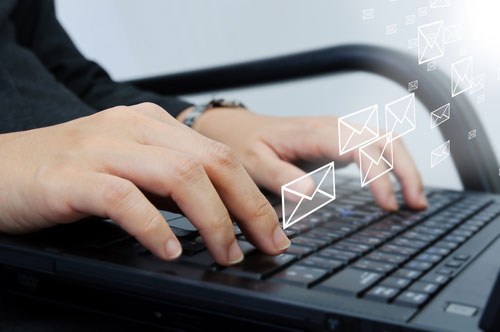
As a freelance writer, the environment you work in may be private and informal, but that should not be emblematic of the way you conduct your business. The work you generate for yourself depends very much on how you build and maintain business relationships, and the majority of those relationships are lived out through email. Communicating professionally and politely with editors and others who influence your paycheck is essential. To prevent rubbing those you interact with the wrong way, read on for some helpful pointers.
1. Avoid All Capitals
Have you ever received an email with words and phrases in all caps? If so, it probably wasn’t a very fun read. To avoid having that effect on the folks you communicate with, avoid the urge to use that type of emphasis. It comes off as yelling, and it can be viewed as disrespectful. Say what you want with proper grammar and if you’re that upset about something, cool off for a minute and then pick up the phone.
2. Always Include a Salutation
Regardless of whether or not you already have a great relationship with someone, always include a respectful salutation. Even if it’s just a quick “Hello” you increase the chances that your email actually gets read, and this is especially true when reaching out to folks for the first time.
3. Think of the Recipient’s Perspective First

Image credit
Right before you hit click, scan through your message and read it from the perspective of the person receiving it. When you do that, you might find parts of it that aren’t perfectly clear, are incomplete, or are potentially misleading. Since email communication doesn’t allow you to read your recipient’s face, you have to anticipate any parts of your message that may be harder to follow and correct them in advance.
4. Make Your Point Quickly
There’s no point in dawdling with your messages – everyone is busy, including yourself. After your salutation, get to exactly what you want to say, make it thorough and clear, and end the message. That said, balance brevity with congeniality. What you never want is to come across as terse.
5. Skip the Humor Altogether
No matter how well you might know your recipient, keep humor out of your emails. It’s too easy to be misconstrued and may also be taken as offensive, which is the last thing you want. Save the jokes for phone conversations or in-person discussions.
Because of the fluid nature of the Internet and freelance work, you generally don’t have to respond to things as quickly as you would in a traditional working environment. Just don’t abuse that luxury. Don’t let emails hang around in your inbox for days without so much as a quick response – if you wait, you give potential employers and other blog owners the impression that you don’t care or aren’t serious about your work. If you’re in the middle of a big project, type out a quick reply saying you’re going to provide a detailed answer soon. Showing dedication and professionalism is the best way to keep your employers happy, and that goes for all forms of correspondence.
What ways can you think of to send emails more professionally?
Dave Adams is a freelancer and online marketing professional who writes about careers and small business.

Leave a Reply